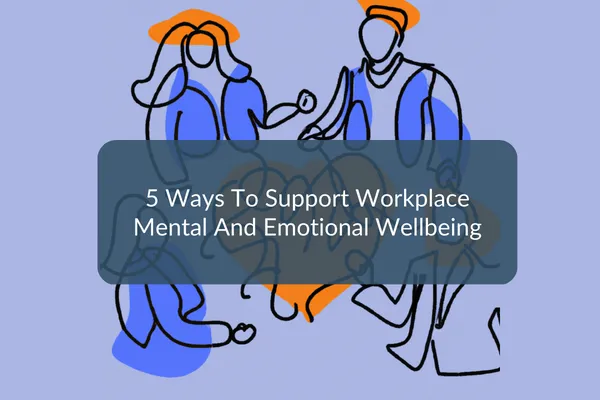
5 ways to support workplace mental and emotional wellbeing
Mental and emotional well-being in the workplace is finally getting the attention that it deserves.
The increase of knowledge on the impact of stress on physical and psychological health is only continuing to increase with the science continually stating that establishing a positive workplace culture has a huge impact on mental well-being.
There are so many factors that go into supporting your employees including:
Developing personal resilience
Introducing fresh ways that employees can promote autonomy
Implementing tools that can effectively manage employees workload
All of these factors have the potential to create a huge change in your workplace (and beyond!) that benefits the mental health of your employees and your business growth.
Let’s dive into what workplace mental and emotional well-being really means, all the benefits that exploring this topic will have on your employees, and five essential ways to get started promoting a culture of mental wellness in your own organisation!
Mental and emotional wellbeing in the workplace
Not so long ago, employee well-being equalled “Fruity Fridays,” on-site massage therapy or giving your employees a discounted gym membership.
This approach simply doesn’t cut it anymore. Whilst there are definitely beneficial perks, they usually don’t touch the sides when it comes to actually working with your employees mental health so that positive effects can be long-lasting - these workplace perks only offer short-term relief.
Science continues to prove the importance of the mind-body connection, and how we should be addressing them both as a whole.
Mental wellness is where an individual can manage feelings of stress and actively reduce them, they can communicate their feelings and emotions effectively, and also have the physical and mental capacity to explore and excel in activities outside of work that they are interested in, they also should be easily able to give something their full attention.
To put it simply, mental and emotional well-being is a state where individuals feel positive about themselves as a whole and the lifestyle that they have created.
But why should this be a priority? Depression alone in the UK costs £9 billion annually.
One in five people say that their workplace culture is a source of stress and in 2020 a study showed that in the UK 79% of British adults have commonly experienced work related stress. It’s now glaringly obvious that a big part of the responsibility lies with the organisation and leaders.
Why is mental and emotional well-being in the workplace important?
Employees that are mentally and emotionally well are six times more productive than those who are struggling. Why? Because they’re able to come to work and focus on the task and not be distracted by excessive worrying or anxiety. When people are mentally well, they have full access to their cognitive and memory functions.
When employees are healthy, they can also actively make decisions and deal with situations in an effective way which is beneficial to your business. They’re also more likely to be able to handle situations that are high pressure and be better equipped if challenges arrive at work (and home!).
Not only that but employees are more creative, collaborative and more engaged in their work. This is even more important if your employees work from home or if your business has a hybrid working system - both the work and home life lines ahev become blurred and they both deeply impact one another.
Your job is to empower employees to effectively manage their home challenges.
There is a certain way to achieve this. After COVID-19, we saw a huge shift in people's priorities with employees now looking for more freedom, more fulfilment and more flexibility. They want more balance in their life!
Five ways to support, workplace, mental and emotional well-being
Promote a healthy work, life balance.
The life’s that people are living outside of work have a huge effect on their work performance.
It may seem like a strange concept that you need to promote a healthy balance outside of work but it is vital.
What this is really about is promoting flexibility and showing that you trust your employees.
Here you should really focus on letting go of micromanaging them and allow people to do their job when they are most productive, and in a way that suits them (whenever possible!). Also, discussing realistic deadlines that do not cause overwhelm or pressure.
Healthy boundaries can be in place for both you and the employee so you can be confident that work is getting done. Other healthy factors you can begin to implement are making sure employees are not working outside of contracted hours, asking employees to schedule emails and enforcing holiday days.
Develop healthy communication habits.
As a business, you should have a direct line of communication and should not be constantly switching between channels like text messages, emails, WhatsApp Messages as this can really stress people out.
Keep it streamlined.
When you have healthy communication in your business, your workplace can collaborate effectively.
The other side of communication is training your employees on listening, developing awareness around other people's thoughts and the impact that their own words can have on others emotional well-being.

3. Create a non judgemental work culture.
Employees like to feel accepted and comfortable to discuss any of their concerns.
Despite all of the progress we are seeing in mental health awareness, there are still plenty of ‘taboo’ topics. For example, many employees believe that if they show signs of struggling under pressure or burnout, they will be perceived as been weak or incompetent.
The first step towards helping your employees to feel safe and empowered is learning that anxiety and stress affects every single one of us, and in many different ways.
As a leader, you have to set an example through your own behaviour, acceptance and openness around mental and emotional health. You are setting expectations.
Workshops are a great example as a good place to start with as it really sparks the conversation around these topics in a judgement-free zone.
4. Provide support for employees who experience mental health issues.
With all these practices in place you really have to continually act on your word.
So, when an employee is struggling with their mental health, you need to be able to provide the support in some way.
This can be daunting for some leaders, but you do not need to do this on your own. Some programs you can opt for consist of a counselling service, employee assistance programs or other external support systems like therapy and coaching. In the UK employees can also be trained to become mental health first aiders which is also something you should consider.
There are also other organisations that offer monitoring support for emotional and mental health in the workplace, this can also help leaders identify team members that are showing signs of burnout.
Companies such as GoVox organise monthly check-ins and establish your employees overall happiness levels and will red flag anybody that may need support.
Creating an open and supportive work culture will take your business a long way. The more that you make them feel valued in their work and confident in talking about any issues. The stronger the work environment will be.
The government employee well-being application also provides your work staff with actionable insights and resources for well-being support.
Whatever support you choose to provide doesn’t really matter as long as you choose one that is right for your employees culture. The important thing is to provide it as quickly as possible so employees do not feel as if things have to get really out of control before they can get help at work.
5.Processes to support individuals and their team.
Having a policy that allows employees to take time off work when suffering with mental health issues is imperative and will ultimately show that you genuinely care about their mental health.
As a business owner, who should have a back up plan so that their workload can be covered if they do need to leave. This is often a source of reassurance for the employee, and the rest of the team alike!
In summary…
Mental and emotional health is an important topic. It should be taken as seriously as physical health in the workplace.
If you take anything from this article, I hope that it is, that as a company you have a duty of care for your employees and as 79% of people in the UK suffer from work related stress, mental health should always be a priority in your business.
The second thing I would love you to take from this is that investing in mental and emotional health is an investment strategy for the future of your business. A strategy that reduces absenteeism, boosts performance, encourages your employees creativity and develops a real sense of community.
Meaning, you will not only keep but also attract the finest talents which is largely beneficial to the growth of your business.
I really do hope that you feel inspired and understand the importance of encouraging and implementing this type of work culture.
As a leader it begins with you!

Or send us an email at contact@clanwellness.com
Copyright ©2023 Resilience for Modern Life - Clan Wellness Ltd - All rights reserved
Tel: 01389 504 550
E: contact@clanwellness.com

